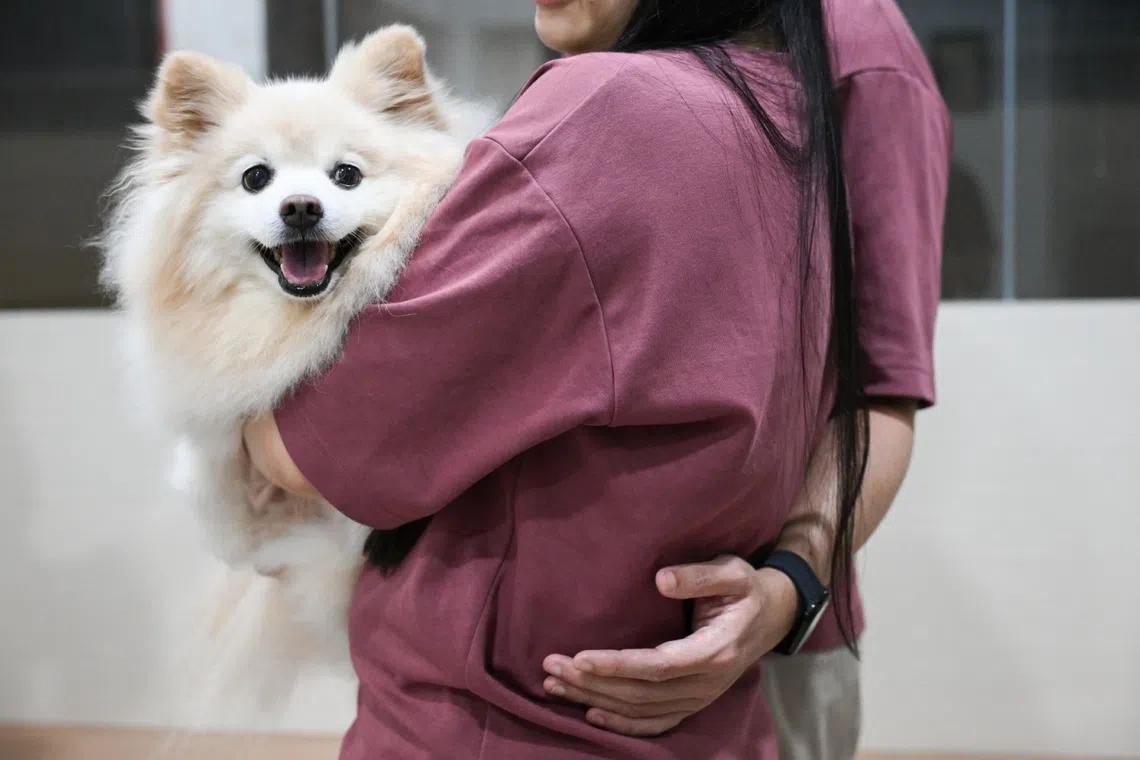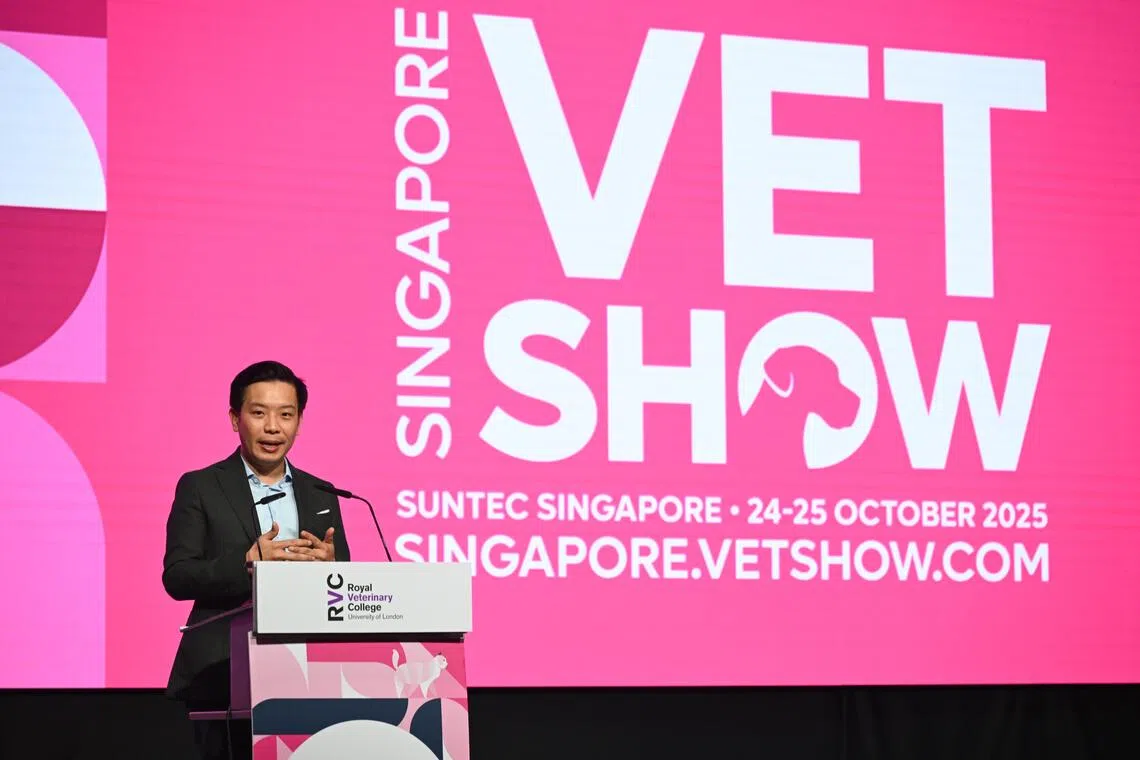Public to be consulted by December on new law to regulate vet sector in Singapore
Sign up now: Get ST's newsletters delivered to your inbox

The number of licensed veterinarians in Singapore has increased from 122 in 2006 to 674 as at September.
ST PHOTO: SHINTARO TAY
Follow topic:
- The public will be consulted on a law to regulate the growing veterinarian sector and penalise misconduct by December.
- The law will establish a Veterinary Council to manage complaints and set professional standards and a registration framework recognising veterinary specialists.
- AVS and the Singapore Veterinary Association launched Veterinary Therapeutic Guidelines to guide novel and alternative pet treatments, addressing increased public interest and ensuring responsible practice.
AI generated
SINGAPORE – The public will be consulted by end-2025 on new legislation to penalise errant veterinarians and regulate Singapore’s growing vet sector.
Making the announcement on Oct 24, Minister of State for National Development Alvin Tan said the Veterinary Practice Bill will create a stronger system for managing complaints, inquiries and investigations involving veterinarians, as well as a mechanism for appeals.
Cases of professional misconduct or negligence will be overseen by a Veterinary Council, he told members of the veterinary community at the Singapore Vet Show at Suntec Singapore Convention and Exhibition Centre.
This comes as the number of licensed veterinarians in Singapore has increased from 122 in 2006 to 674 as at September.
Mr Tan, who is also Minister of State for Trade and Industry, said the law will also introduce a new registration framework for veterinarians, which includes a register for veterinary specialists that recognises those with additional training and qualifications.
All veterinarians currently licensed by the National Parks Board’s Animal and Veterinary Service (AVS) will be onboarded to the new framework, he added.
The proposed law will introduce penalties for veterinarians that can be enforced by the Veterinary Council
The professional body will also set out professional standards for continuing education, practice, conduct and ethics of veterinarians, among other things.

Minister of State for National Development Alvin Tan announced that the public will be consulted on a law to regulate the vet sector during the Singapore Vet Show at Suntec Singapore Convention and Exhibition Centre on Oct 24.
ST PHOTO: SHINTARO TAY
Singapore Veterinary Association (SVA) president Teo Boon Han said the formation of a Veterinary Council will send a strong signal that policymakers and society see the profession in a different light now. “Decades ago, there were very few vets,” said Dr Teo. “Now, with people having more pets and pets being increasingly seen as family members, I think the awareness of what vets do and their contributions to society have increased.”
While the sector has been regulated by AVS, Dr Teo said the representation of different industry partners in the future council will enable it to respond quickly to changes in the industry.
Dr Grace Yam, deputy director of the Animal and Veterinary Programme Office at AVS, told the media seeds for the council’s creation were sown in 2021, after an industrywide survey to improve the sector showed strong support for a council dedicated to maintaining and raising the sector’s standards. To date, a total of 450 people including veterinarians, veterinary nurses, pet establishment operators and users of veterinary services have been engaged on plans for the council, she said.
Said Mr Tan: “(The feedback) has helped us fine-tune our proposals and work out transition arrangements to ensure continuity of veterinary services to the animal industry.”
The engagement has also “helped us to carefully consider our approach towards essential supporting personnel, such as veterinary nurses”, he added.
When passed, the legislation will first apply to veterinarians, before it is eventually extended to veterinary nurses.
The public will be invited to provide feedback on the proposed law on the Reaching Everyone for Active Citizenry @ Home (Reach) platform for a month, AVS said in a statement.
“The Veterinary Council will provide pet owners with greater assurance that their veterinarians meet established professional standards and are held accountable for their practice,” it said.
While the council was initially slated to be set up in 2025, several factors delayed its launch.
Said Dr Yam: “This includes conducting more comprehensive consultations with veterinary professionals and industry stakeholders to better align the Veterinary Council’s regulatory functions to the profession’s needs and challenges.
“Additional time was also needed to study in detail the legislation and regulatory frameworks of other reputable and more mature international jurisdictions to identify best practices that can be effectively adapted to Singapore’s context.”
The standards set by the council will be regularly reviewed and benchmarked against these countries, which include Britain and Australia, she added.
At the event on Oct 24, Mr Tan also announced a set of Veterinary Therapeutic Guidelines jointly developed by AVS and the SVA in response to growing interest in unconventional therapies for animal patients. This provides guidance for treating pets with non-conventional therapies like novel therapies, which are treatments with minimal or no established history for a specific ailment in a particular animal species, as well as alternative therapies or treatments relying on the body’s healing processes.
Dr Yam said AVS had noted a general increase in the use of non-conventional therapies by pet owners and vets.
“Nowadays with the internet, there’s a lot of information that people can access online, so there’s been an increase in the interest, and also people wanting to try to explore more options for their pets,” she added.
Examples of novel treatments include stem cell therapy and administering medications originally formulated for horses to dogs and cats.
With the document, pet owners and veterinarians will learn the factors that should be considered when deciding which therapy should be applied.
Dr Chow Haoting, who participated in the formulation of guidelines for animal therapies, said the guidelines will help vets and pet owners to navigate new trends showing up on TikTok and Instagram.
“Nowadays, potential therapies get amplified on social media,” he said. “It can be very enticing when a certain individual shares a story that without any form of medicine, with natural therapy, they are able to cure a particular disease.”
The document can be accessed at this website


